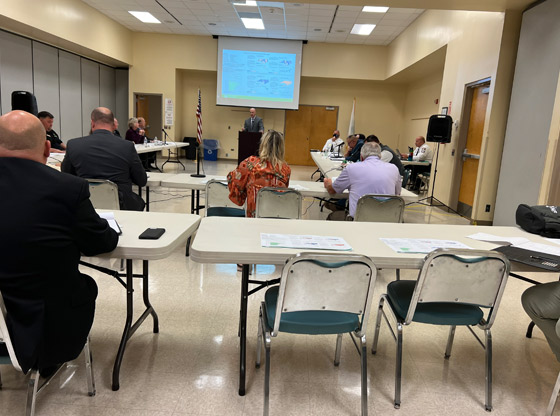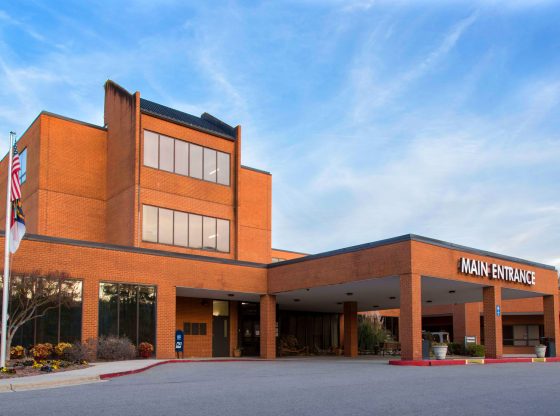The Moore County Commissioners conducted a special meeting Wednesday at the Moore County Agriculture Center in Carthage. In attendance were municipal leaders from around Moore County and many organizations that specialize in helping those addicted to drugs.
North Carolina is part of a $26 billion opioid settlement designed to help communities combat drug addiction at the local level. The meeting discussed ways to use Moore County’s portion of the settlement that is over $6.2 million spread over 18 years.
A tentative agreement was reached in 2021 with four drug companies but was not implemented until at least 90% of the municipalities involved in the lawsuits agreed to the settlement. That threshold was reached earlier this year.
A separate lawsuit against Purdue Pharma L.P. who manufactured OxyContin is ongoing. The company was forced into bankruptcy, and the Sackler family, owners of Purdue Pharma L.P., are currently negotiating settlements with a consortium of states.
Matthew Garner, interim director of the Moore County Health Department, presented some sobering facts. For the last 12 years, overdoses have been a priority in health care. In 2020, Moore County had 21 deaths due to illicit drug overdoses, and 23 overdose deaths from prescription drugs. Statewide, the number has been rising since 2000 with 3,759 deaths in 2021.
D. Bryan Phillips, Moore County EMS director, recounted a recent incident. Two separate overdoses were called in, two EMS units were dispatched, and Narcan was given to both patients. A few hours later, one of the patients overdosed again and died. According to experts, the time immediately after a patient is released from jail or leaves rehab is at the greatest risk of death.
Dr. William Johnstone, Jr, who was present at the meeting, said, “People addicted to drugs will build up a tolerance and need more and more drugs (or a higher dose) to get the same effect as the body builds resistance over time. So when a person leaves jail or rehab, they will use the same dose they used before,” and the effects can be fatal.
The consensus of the organizations present, including Sandhills Opioid Response Consortium, Sandhills Center, Samaritan Colony, Sandhills Teen Challenge, and Drug Free Moore County, is that addiction is a disease. If an addict returns to their old environment, they will eventually become addicted again. And that recovery depends on intervention including providing a safe space to stay.
Peer-to-Peer Counselor Mark C. briefly shared his journey from addiction to leading a clean and sober life.
“Withdraw is pure hell, and nobody wants to go through it,” said Mark C.
“It will last for days, and the only relief is to fall asleep and dream of being high,” said Johnstone, Jr. “Withdraw scares many addicts, and they will do anything possible to prevent it.”
Narcan is a drug used to treat overdoses and, in many instances, can be a lifesaver. Currently, each local community purchases its supply. Several representatives asked if the county can act as a central purchasing house providing Narcan to local agencies as needed. Asked by Sandhills Sentinel after the meeting, Moore County Commissioner Nick Piceno said he was open to making things more efficient.
Moore County Sheriff Ronnie Fields stated, “We can’t arrest our way out of this.”
Moore County Commissioner Catherine Graham asked, “Is there any way to require rehab or patient treatment before being released?”
Fields responded they have no choice but to release someone, and it would take legislation and judicial involvement to make those changes.”
Stephanie Blair, regional representative for Sen. Thom Tillis, was asked if any action was being considered. She responded not that she was aware of, but it would be up to Tillis.
Fields encouraged people to report suspicious activity. “If you see it, report it. We will investigate, and you may save someone’s life.”
Graham mentioned that there were people missing from the discussion “including medical officials, judges, probation officers, and others.” She would like to see more involvement.
Moore County Commissioner Frank Quis closed the meeting by thanking everyone for coming. “It is complicated, but from my perspective, we need to get together in three months.”
According to Moore County Manager Wayne Vest, the final procedures for applying for the grants have not been worked out. But they expect to have something worked out in the next couple of weeks, and all the agencies will be notified and given a chance to apply for the funds.
N.C. Attorney General Josh Stein met with Moore County Commissioners and potential opioid-abuse treatment partners Sept. 26.
“We are in the deadliest moment in the deadliest drug epidemic in American history,” Stein said at that meeting. To read more about Stein’s visit, please click here.
Feature photo: County leaders and local organizations meet on Oct. 5 at the Agriculture Center in Carthage to discuss ways to use funds in an opioid settlement.
 ~Written by Sandhills Sentinel Reporter Chris Prentice. Contact him at [email protected].
~Written by Sandhills Sentinel Reporter Chris Prentice. Contact him at [email protected].

















